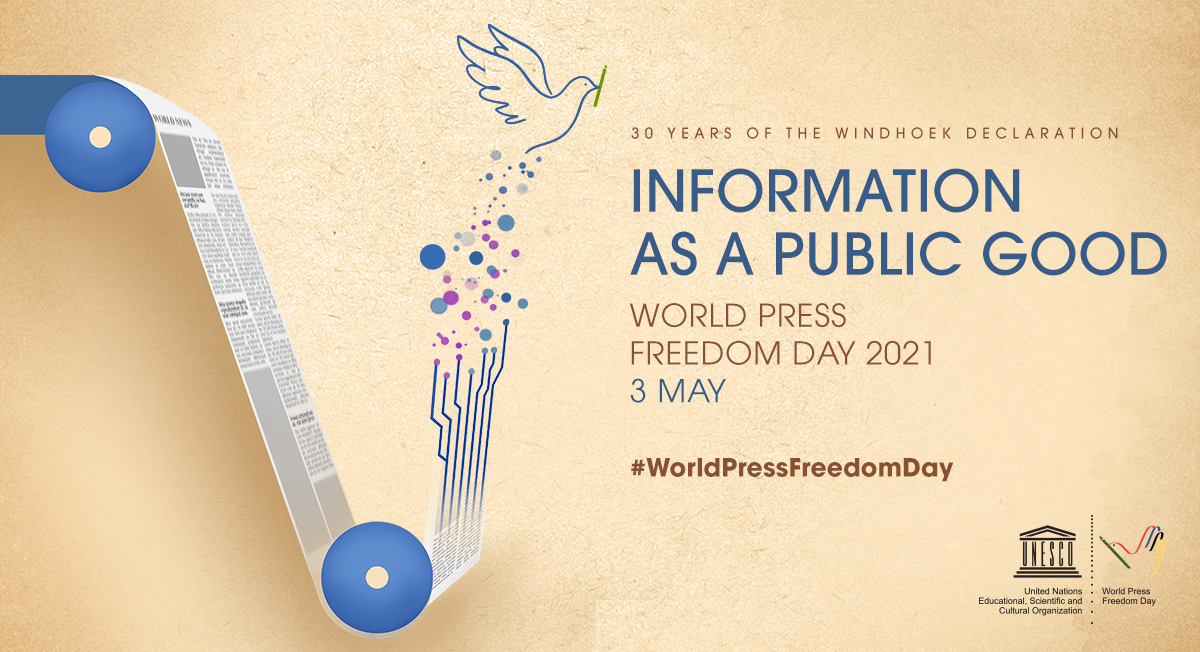Image courtesy: UNESCO
Here are some quick historical facts about journalism and media freedom’s big international day.
Namibia plays the official host to the marking of World Press Freedom Day 2021 on 3 May 2021, bringing the commemoration of the day full-circle to where it all started 30 years ago in 1991.
Did you know?
- 3 May was adopted as the day to mark World Press Freedom Day by the UN General Assembly in 1993;
- The first World Press Freedom Day was officially marked on 3 May 1994 at the UNESCO headquarters in Paris, France;
- 3 May was chosen as the day for World Press Freedom Day as that was the date when African journalists, editors and media organisations, along with international partners and agencies, that had gathered in the capital of recently independent Namibia, adopted the ‘Declaration of Windhoek on Promoting an Independent and Pluralistic African Press’, simply known as the Windhoek Declaration, at the end of a meeting that lasted from 29 April to 3 May 1991;
- World Press Freedom Day 2021 is held under the theme ‘Information as a Public Good’, with the official programme running from 29 April to 3 May 2021;
- World Press Freedom Day 2021 marks the second time that Namibia has played official host to the international day. The first time Namibia hosted the World Press Freedom Day was in 2001, to mark ten years since the adoption of the Windhoek Declaration;
- On the visual identity of World Press Freedom Day 2021, UNESCO states: “The design is inspired from the original historic poster of the 1991 [Windhoek] Seminar. In a way, the poster represented the aspirations of the signatories of the Windhoek Declaration for a free, independent and pluralistic press, which will later become a gift of Africa to the world, delivered by UNESCO. For the 30th anniversary, the 2021 visual identity pays tribute to the forerunners and succeeding champions of the Windhoek Declaration and press freedom around the world, by reinterpreting the original design of the 1991 [seminar] and recognizing that reliable information is a public good that helps to advance our collective aspirations”;
- The UNESCO / Guillermo Cano World Press Freedom Prize is named after the former editor of Colombian newspaper El Espectador, Guillermo Cano Isaza, who was assassinated in December 1986 in the Colombian capital, Bogota;
- The first UNESCO / Guillermo Cano World Press Freedom Prize was awarded to Chinese journalist Gao Yu on 21 March 1997;
- The 2021 prize award coincides with the marking of the 20th year since the disappearance of 2017 laureate of the UNESCO / Guillermo Cano World Press Freedom Prize, Eritrean journalist Dawit Isaak, following his arrest by Eritrean authorities in 2001;
- Philippines investigative journalist and media executive, Maria Ressa, who is the 2021 UNESCO / Guillermo Cano World Press Freedom Prize laureate, is the 11th female recipient of the prize;
- The US$ 25,000 prize money of the UNESCO / Guillermo Cano World Press Freedom Prize is partly funded by the Namibia Media Trust, which is chaired by founder and former editor of The Namibian newspaper, Gwen Lister, who played a prominent role in the crafting and adoption of the Windhoek Declaration in 1991.
The official hashtag for World Press Freedom Day 2021 is: #WorldPressFreedomDay
Most of the information on this page was sourced from UNESCO.

